Military service members reflect on their studies in Human Rights Practice
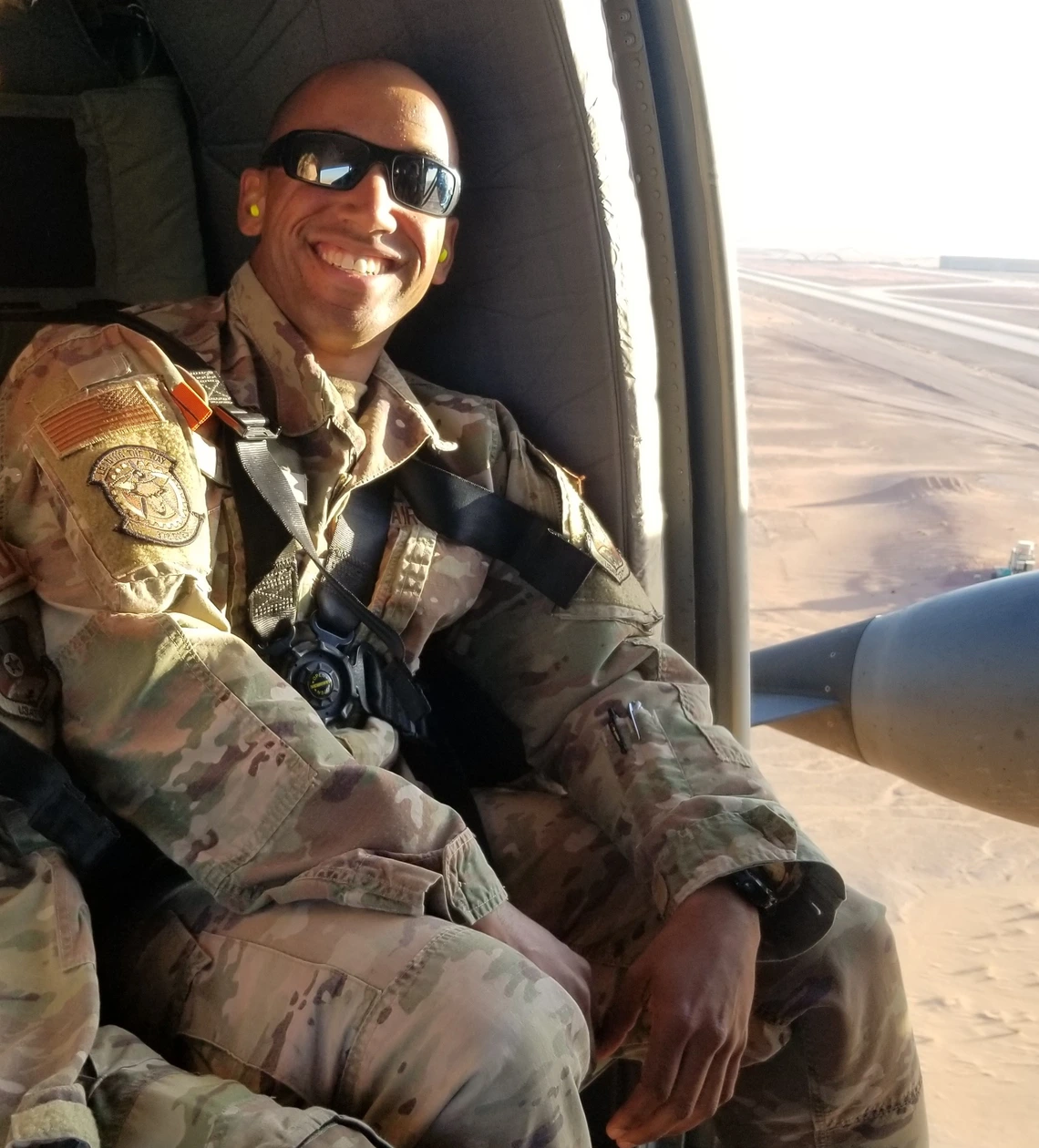
Phillip Felton (US Air Force) is currently a student in the University of Arizona's Human Rights Practice MA program.
In honor of Veterans Day, we are highlighting reflections by some past and present Human Rights Practice students about how their experience in the military relates to their studies. We are proud to have these students in our program and grateful to them for their service. Highlighted below are thoughts from MA Program alums Christopher Mitchell (US Army) and Laikyn Gonzalez (US Air Force) along with current MA student Phillip Felton (US Air Force). This article was developed by Human Rights Practice faculty member Dr. Raymond Smith.
On our website, you can learn more about the University of Arizona’s Human Rights Practice MA and Certificate as well as our specialized Graduate Certificates on Gender-Based Violence; Human Rights and Documentary Media; and Human Rights and Technology. We also offer a BA major and minor.
How do you see your military service relating to the field of Human Rights Practice?
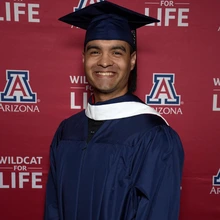
US Army Veteran Christopher Mitchell graduated from the Human Rights Practice Program in 2022.
Christopher Mitchell: In my experience, there are many parallels between military service and the field of Human Rights Practice. A significant portion of the military’s success is based upon service members who recognize the importance of human rights-related issues that impact military operations, foreign operations, and the very service members within each organization. The military is comprised of all types of people who come from several communities, therefore, being aware and educated about LGBTQ+ issues, racism, gender-based violence, rules associated with the laws of war, human trafficking, diversity and inclusion initiatives, and the like, is essential to ensuring that you are addressing the needs and wants of a diverse population.
Moreover, I was once a working group lead for a diversity and inclusion program that served around 50,000 service members and their families. The program aimed to expand the cultural, ethnic, and diversity education and awareness of the minoritized, while also helping to address the root causes of institutional racism and bigotry. Some of the resources my working group helped to create were based on disability rights, anti-racism, LGBTQ+ awareness, indigenous issues, and related issues. Some of these very communities were also areas of focus within my HRTS scholarship. Therefore, my HRTS education assisted me with some of the diversity and inclusion work/advocacy I was working on while I was in the Army, because these types of initiatives even exist within organizations like the military.
Phillip Felton: It is impossible not to recognize that many of the human rights crises that afflict the world are born from war, and that war is more often than not the point at which a struggle for resources (land, water, precious metals, oil, people, even political standing) breaks down. In all honesty, the question I ask myself after learning as much as I have both in my studies within the Human Rights Practice program and my personal research is: "am I doing all I can to ensure that my duties to the United States Constitution and its protection therein, and my advocacy for those values laid out in the Universal Declaration of Human Rights (UDHR), are not in conflict?"
Some might argue this to be difficult, but I don't see it that way. The U.S. Constitution, while an imperfect document in its original form, was designed to be updated to suit the needs of the growing country should the people have the ability to look past themselves and work to form that More Perfect Union for all. Those rights enshrined in our Constitution aren't very far off from those in the UDHR itself; while there are differences, honest acts of good will would recognize that the intent is the same. Couple this with the outlining of basic rights afforded to all citizens and I see my service to my nation as of stupendous value.
My service is not to support an economic system that serves the wealthy who profit off of injustice; it not to spread a vague platitude of freedom to those who may live in a way different than I; nor is my service wrapped up in the personality of one single person. Instead, I serve to defend a Constitution that at its heart defends rights for all. Further, my work in removing explosive hazards from the battlefield only helps everyone; no matter what side of the conflict a person is on, I can rest assured that my mission prevents anyone from being hurt. It is a very fulfilling career in that respect.
Laikyn Gonzalez: My military service gave me a unique perspective into the real world implementation and practice of human rights. I’ve actively been involved in international humanitarian efforts, such as US efforts in the Middle East. This included promoting diplomacy and women’s rights. While my studies in human rights opened my eyes to other issues, my military service gave me insight into the limitations in human rights response strategies in practice.
How can active duty or reserve military service members and veterans benefit from the Human Rights Practice program at UArizona?
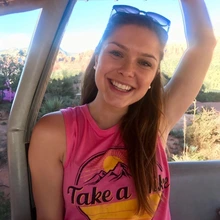
US Air Force Veteran Laikyn Gonzalez completed the UArizona MA Program in Human Rights Practice in 2022.
Laikyn Gonzalez: I absolutely recommend this program to active duty service members and veterans. This program opens eyes, doors, and relationships. Military personnel bring a national security and diplomacy perspective to this program, which is vital to holistically understanding human rights. On the flip side, this program provides military personnel a deeper perspective and understanding into issues we may not know about, simply because it’s not a part of US interests or involvement at the time.
Phillip Felton: I can only speak for myself in saying that I have gained an awareness of how warfare and decisions made have repercussions long past their inception. Bearing witness to survivors of, and refugees from, conflict around the world puts a different perspective on many things I was taught growing up; a greater empathy for those beyond my community, state, and nation is gained from such exposure. The opportunities to meet and work with people around the world are not in short supply in the military, and I am grateful and proud of my work to build relationships across borders in uniform and representing the United States military at its best. To do so outside of uniform provides its own sense of fulfillment as well.
Christopher Mitchell: I believe there are some core academic skills and competencies associated with the HRTS program that service members and veterans can implement within the own military careers, leadership approaches, as well as within their personal community advocacy. For example, if military veterans want to start their own non-profit to benefit veterans or to learn how to effectively use human rights-oriented advocacy and activism to improve the lives of service members and veterans, you can learn how to do that within the HRTS program. If active service members want to strengthen their ability to lead and serve a wide number of communities, you can develop your ability to do so within the HRTS program. Ultimately, when you are adhering to the many core tenants of human rights practice as a service member you are simultaneously fulfilling the military’s code of ethic, honor ethos, and legal obligations.
Could you tell us more about your military experience and what you have gained from it?
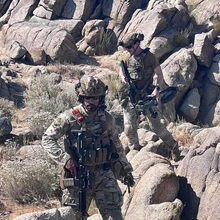
Phillip Felton (US Air Force, foreground in photo) is a student in the UArizona MA program in Human Rights Practice.
Philip Felton: I've been in the military for going on nine years now. Holding the grade of E6 as an Explosive Ordnance Disposal Technician, my primary duty is to lead a team of fellow technicians in operations of rendering safe various explosive hazards such as unexploded ordnances (grenades, rockets, landmines, etc), improvised explosive devices, and aircraft, to name a few. In doing so I work to ensure that no persons that might come across these items will be injured, maimed, or killed.
While that primary calling is of utmost importance, I recognize that I cannot do the job forever; it falls to those in my position to provide training and pass experience gained in our careers to the next generations that will carry on those duties as we transition to other areas of responsibilities. To that end I work to hone my skills and help others refine their own so that some of my knowledge may carry out their missions with nothing less than success.
Laikyn Gonzalez: I joined the military right after high school, attending a military college and graduating with a bachelors of science and a commission as an officer in the United States Air Force. I served as an Intelligence Officer for five years, traveling the country, and deploying around the world. I served with Americans from many different backgrounds and experiences, as well as servicemen and women from around the world. I gained the invaluable lesson of perspective and how interconnected our world really is. I learned about politics, diplomacy, and most important of all, why things that happen across the globe matter.
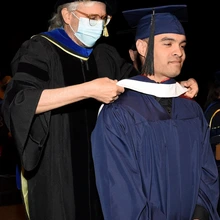
In this photo, US Army veteran Christopher Mitchell receives a ceremonial graduation hood from Human Rights Practice Professor Leonard Hammer. A former Army sergeant, Mitchell also holds a JD from Louisiana State University and an MEd from the University of Pennsylvania.
Christopher Mitchell: I was an active-duty Military Police officer for the U.S. Army for five years. I entered the military when I was twenty-eight years old, so I came in with a decent amount of prior life experience, as well as multiple college degrees. The Army has a leadership requirements model that is comprised of both competencies (leads, develops, achieves) and attributes (character, presence, intellect), along with a few ethos and value systems predicated upon things like honor, integrity, and selfless service. With this in mind, because of my life experience, perspectives, innate leadership abilities, and my strong work ethic, I was able to earn several leadership roles and responsibilities that were of tremendous significance to all the organizations I was assigned to. Thus, I was tasked with serving with, under, and alongside a broad range of service members who comprised a bevy of ethnic groups, social classes, religious backgrounds, nationalities, etc., across multiple states and countries. Acting as a leader, coach, mentor, and source of support for countless soldiers helped me to strengthen my leadership abilities in ways that are transferable to a multitude of professions and environments.
Essentially, the Army enabled me to strengthen my leadership skills, and in doing so I am a more capable educator and public servant. The Army helped to prepare me to assist various communities across a broad spectrum of demographics because of the improved leadership aptitudes I acquired during my time in the military. The Army expanded my world experience, as well as enhanced leadership expertise, so my overall experience was a positive one. When you truly commit and adhere to the positive military values and training programs (diversity and inclusion, anti-sexual harassment/assault, equal opportunity resources, etc.) you can unlock the knowledge and skills you need to be an equity-oriented human being both inside and outside of the military. Lastly, because I was also earning my Human Rights Practice MA. while I was serving, I was able to incorporate numerous human rights and social justice-oriented strategies into my Army leadership style and in ways that served the diverse communities I was protecting, assisting, and defending – here and abroad.

